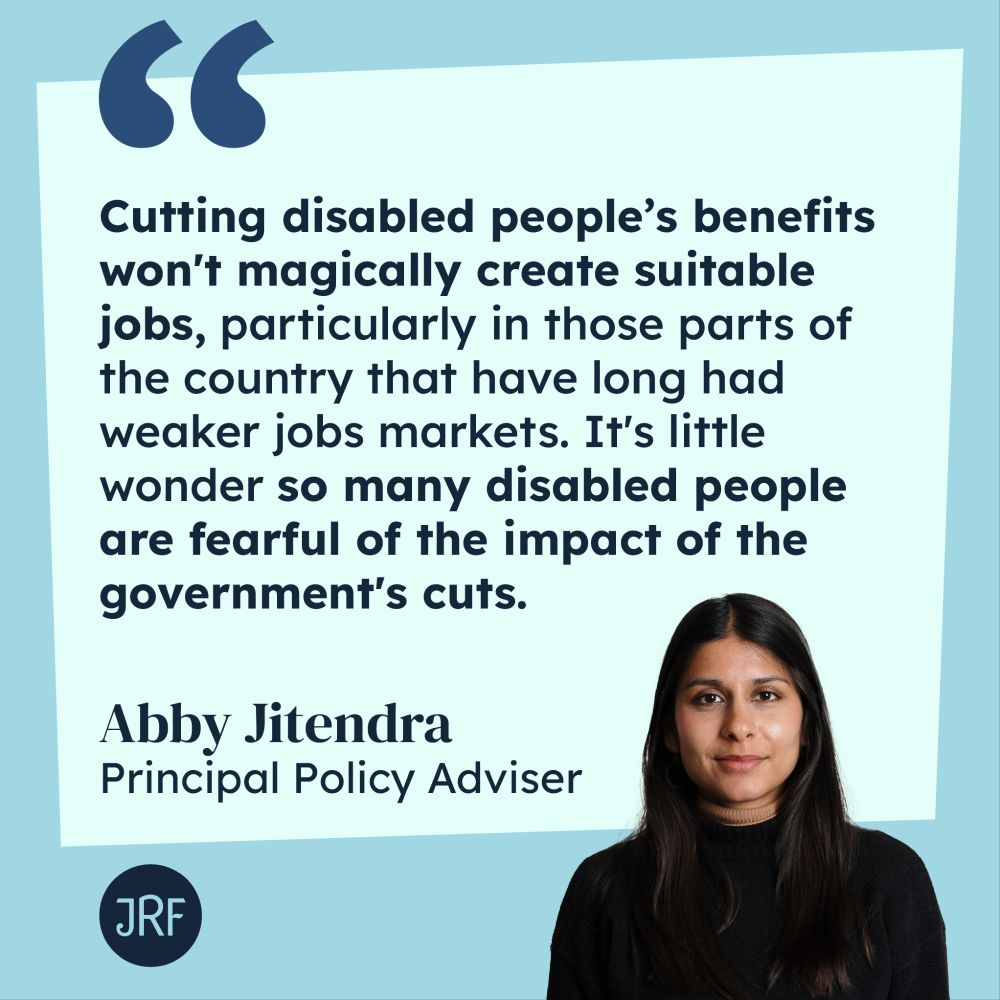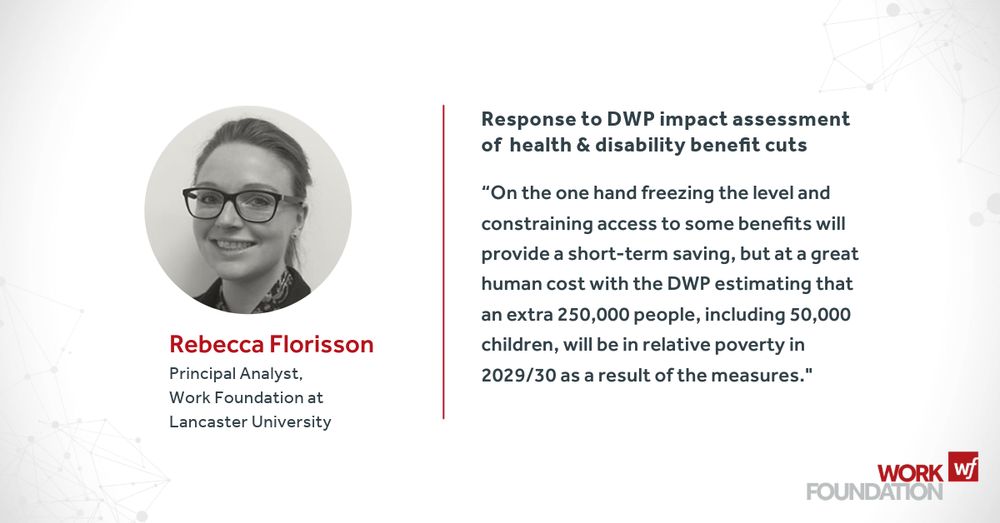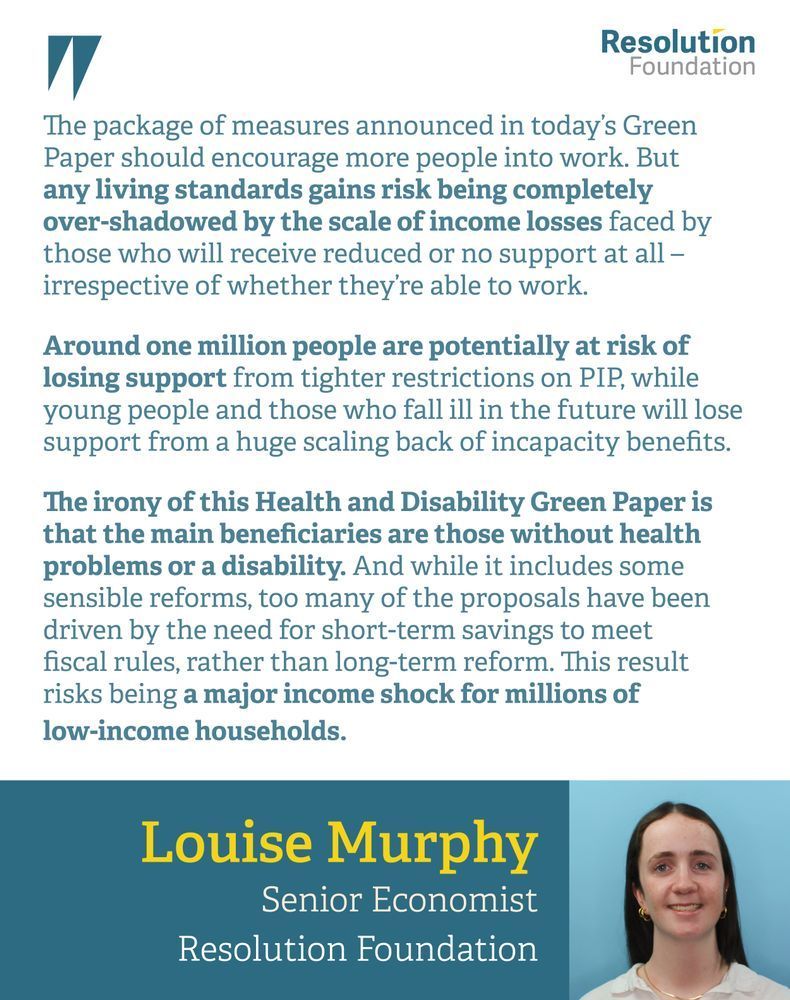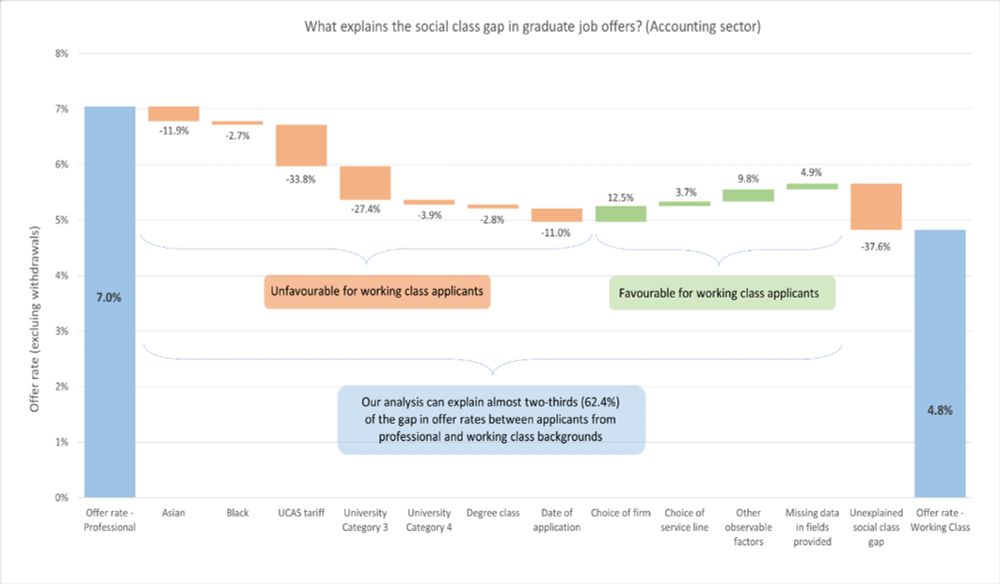
Zero-hours contracts: peers accused of ‘trying to block stronger UK workers’ rights’
27.07.2025 23:18 — 👍 61 🔁 16 💬 7 📌 0@rebeccaflorisson.bsky.social
Principal Analyst at the Work Foundation and part- time PhD at Queen Mary Uni of London. Insecure work, labour markets, data. Opinions my own.

Zero-hours contracts: peers accused of ‘trying to block stronger UK workers’ rights’
27.07.2025 23:18 — 👍 61 🔁 16 💬 7 📌 0
"Cutting disabled people's benefits won't magically create suitable jobs, particularly in those parts of the country that have long had weaker jobs markets. It's little wonder so many disable people are fearful of the impact of the government's cuts" - Abby Jitendra, Principal Policy Adviser
Ahead of a crucial vote on cuts to disability benefits, our new evidence casts doubt on whether jobs are even available for disabled people facing cuts 📢
The analysis found that the parts of the country among the hardest hit by the cuts have fewer job opportunities 1/3

In a weakening labour market, we need a safety net that supports—not penalises—those seeking secure, good quality work. The Chancellor must rethink cuts that hit the most vulnerable hardest.
Full article @workfoundation.bsky.social here: www.lancaster.ac.uk/work-foundat...
(6/6)
Cuts to health-related benefits, such as PIP, are being pushed ahead of promised employment support or job quality reforms. The government’s own estimates show more will be pushed into poverty than helped into work. This sequencing is backwards. (5/6)
10.06.2025 13:15 — 👍 1 🔁 0 💬 1 📌 0I'm increasingly concerned about job quality. Temporary work is at an 18-month high, with 1 in 4 workers in temp jobs doing so involuntarily. Meanwhile, record numbers are juggling second jobs to make ends meet. That’s not a sign of a healthy economy. (4/6)
10.06.2025 13:15 — 👍 2 🔁 0 💬 1 📌 0Older workers (50–64) face particular barriers. While more are re-entering the labour market, nearly 1 in 5 who did so in the last year still haven’t found work. This group needs tailored support—not increased pressure through benefit cuts. (3/6)
10.06.2025 13:15 — 👍 1 🔁 0 💬 1 📌 0The number of jobseekers out of work for over a year rose by 68,000—highlighting that many are not just struggling, but stuck. This kind of long-term unemployment undermines wellbeing and future job prospects. (2/6)
10.06.2025 13:15 — 👍 1 🔁 0 💬 1 📌 0Today’s stats paint a picture of a weakening labour market. Unemployment is rising (4.6%), vacancies are falling, and more people are returning to the labour market—often out of necessity, not opportunity. This should be a red flag ahead of tomorrow’s Spending Review. 🧵(1/6)
10.06.2025 13:15 — 👍 1 🔁 3 💬 2 📌 0
Really pleased to be featured in @the-independent.com yesterday in response to the rise in zero-hour contracts.
Contary to some expectations, employers are not (yet) dropping zhc's ahead of the Employment Rights Bill coming in.
www.independent.co.uk/news/uk/home... @workfoundation.bsky.social

Read the full analysis here: www.lancaster.ac.uk/work-foundat... @workfoundation.bsky.social
13.05.2025 13:11 — 👍 0 🔁 0 💬 0 📌 0📣 We’re at a crossroads.
More people are ready to work — but is the labour market ready for them?
Policymakers need to focus not just on participation, but on ensuring the right kinds of jobs exist: secure, suitable, and sustainable. Otherwise, we risk deepening the cycle of precarity.
⚠️ Insecure work is also on the rise. Zero-hours contracts are up 130k in a year — 81% of these new contracts are held by women.
Despite the upcoming Employment Rights Bill, many employers are doubling down on this one-sided flex — often at the expense of security.
🧩 Economic inactivity has fallen slightly to 21.4%. More people want to work — nearly 2 million now say they’re open to jobs.
But here’s the catch: there’s a growing risk of mismatch. Demand is rising, but opportunities (and job quality) are lagging.
📉 Vacancies continue to decline, now below pre-pandemic levels.
This isn’t just about rising labour costs — though those matter, especially in low-wage sectors. Structural changes in industries like retail and care also play a key role.
The jobs people need aren’t always the jobs available.
🔎 The UK labour market appears steady — but beneath the surface, pressure is building.
This month’s ONS figures show employment holding at 75%, but early indicators suggest we may be heading for turbulence. Let’s unpack what’s happening. 🧵
Comment from our Principal Analyst @rebeccaflorisson.bsky.social on zero-hour contract data from the ONS ⬇️
“Today’s data indicates a marked increase in the use of zero-hour contracts in the last year. There are now 1.17 million zero-hour contract workers, the second highest level on record. (1/7)
Spot on, @jonburton.bsky.social! Workers can remain stuck in insecurity for many years, with detrimental impacts on earnings, health and future opportunities - and ultimately the economy.
Read the blog here: blog.ukdataservice.ac.uk/no-progress-...

Our Principal Analyst @rebeccaflorisson.bsky.social recently spoke to HR360 about the Government's flagship Employment Rights Bill and what it could mean for workers and employers.
hr-360.co.uk/leadership-i...
Here are the three top takeaways (1/4):

Yesterday's #SpringStatement was costed & found to push 250,000 more people into poverty by 2029/30—including 50,000 children. Today, new gov analysis shows 28% of children already live in material deprivation. Austerity isn't over. It's deepening. www.gov.uk/government/s...
27.03.2025 10:29 — 👍 1 🔁 1 💬 0 📌 0
https://www.sgsss.ac.uk/studentship/disabled-peoples-lived-experiences-of-benefit-reform-and-the-costs-of-disability/ ESRC-funded Supervisor-led Studentship Disabled People's Lived Experiences of Benefit Reform and the Costs of Disability University of Glasgow Supervisors: Professor Sharon Wright, Professor Charlotte Pearson, Dr Clementine Hill O'Connor Deadline 10 April, 5pm BST References due 16 April, 5pm BST To apply go to apply.sgsss.ac.uk Picture of historic stone Glasgow University building with green grass, trees and sunshine.
Spread the word! Exciting new fully funded PhD opportunity to research disabled people's lived experiences of benefit reform and the costs of disability.
Deadline: 10 April
@uofglasgow.bsky.social @uofgussp.bsky.social @uofgsps.bsky.social @sgsss.bsky.social @clemmiehilloconnor.bsky.social

Comment on DWP welfare reform impact assessment - Rebecca Florisson (Principal Analyst, Work Foundation at Lancaster University) “On the one hand freezing the level and constraining access to some benefits will provide a short-term saving, but at a great human cost with the DWP estimating that an extra 250,000 people, including 50,000 children, will be in relative poverty in 2029/30 as a result of the measures."
Earlier today, our Principal Analyst @rebeccaflorisson.bsky.social
responded to the Department for Work and Pensions's impact assessment of the health & disability benefit cuts⬇️
Read the full statement here: www.lancaster.ac.uk/work-foundat...
Our Principal Analyst @rebeccaflorisson.bsky.social responds to DWP's impact assessment of the health & disability benefit cuts⬇️
“The Chancellor pledged to restore stability in part by making cuts to welfare, but in doing so the Government is likely to inject instability into... (1/6)

Quote: Louise Murphy, Senior Economist at the Resolution Foundation, said: “The package of measures announced in today’s Green Paper should encourage more people into work. But any living standards gains risk being completely over-shadowed by the scale of income losses faced by those who will receive reduced or no support at all – irrespective of whether they’re able to work. Around one million people are potentially at risk of losing support from tighter restrictions on PIP, while young people and those who fall ill in the future will lose support from a huge scaling back of incapacity benefits. The irony of this Health and Disability Green Paper is that the main beneficiaries are those without health problems or a disability. And while it includes some sensible reforms, too many of the proposals have been driven by the need for short-term savings to meet fiscal rules, rather than long-term reform. The result risks being a major income shock for millions of low-income households.”
The Health and Disability Green paper will deliver tiny income gains at the cost of major losses for those with health problems or a disability.
Restricting PIP qualification to save £5bn would mean between 800,000 & 1.2 million people losing support of between £4,200 & £6,300 per year by 2029-30.

Great to see the @bigissue.com pick up on our policy paper today on disabled workers' experiences of remote and hybrid working @irhws.bsky.social with @lancasteruni.bsky.social @manmetuni.bsky.social & Universal Inclusion, supported by the @nuffieldfoundation.org
www.bigissue.com/news/employm...

Pleased to see the launch of the first output from our @irhws.bsky.social project today, exploring disabled workers' experiences of remote & hybrid working and putting forward a number of policy recommendations for the government. Thread below on some of our key findings 👇
13.03.2025 08:41 — 👍 6 🔁 3 💬 1 📌 0Looking ahead to the disability benefits green paper, this essay for @citizensadvice.bsky.social makes the case for a system focused on improving health outcomes.
Co-authors @maddyirose.bsky.social, @victoria-anns.bsky.social & Simon Collerton
We challenge the 5 big falsehoods underpinning cuts…🧵

📢 New blog post 📢
💼Why are working class applicants less likely to be hired?
blogs.ucl.ac.uk/cepeo/2025/0...
Following on from our @nuffieldfoundation.org report today’s blog post focuses on why working class young people (yp) are less likely to be offered jobs than their more advantaged peers
I constantly hear/see journalists, commentators & interviewers asserting how easy it is to get incapacity & disability benefits despite clearly having no real understanding of how the process actually works or having spoken to someone who's been through it. Completely distorts public understanding
06.03.2025 08:59 — 👍 262 🔁 102 💬 20 📌 4Government should consider extending the age range for the Youth Guarantee to 16-24 year olds.
It's a difficult labour market for young people. Today's data really highlights that even the term NEET covers very different groups which need different approaches/support. (4/4)
Difficult career starts can lead to scarring and impact future earnings and health - so it's key to reduce the number of NEET but also to reduce the duration people spend as a NEET.
Gov's proposed Youth Guarantee is a good step, but covers only 18-21 year olds (half of NEET). (3/4)